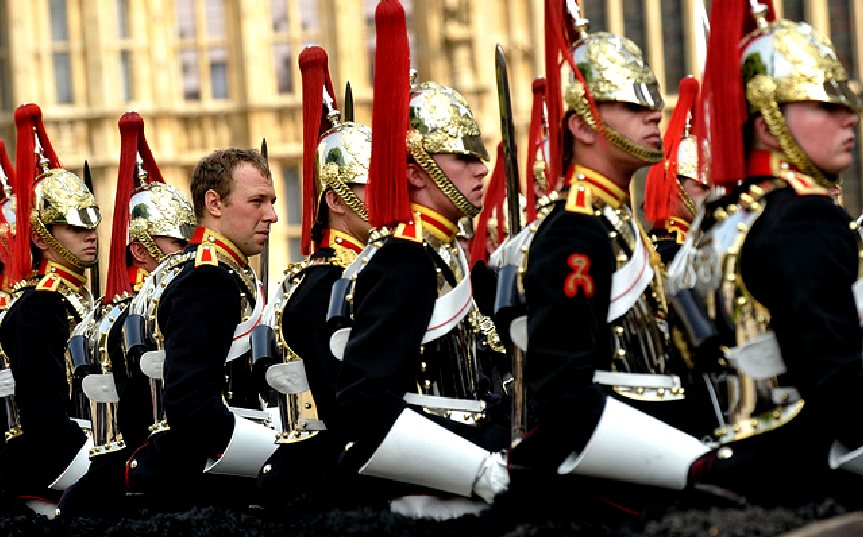
The Queen was born in 1926. She was 91 in 2017. We hope that she makes it to her 100th birthday in
2026 and beyond regardless of whether or not she is still capable of
ruling the country, or being the head of state of the Commonwealth
countries.
DAILY EXPRESS APRIL 21 2017
- WHY DOES THE QUEEN HAVE TWO BIRTHDAYS
QUEEN Elizabeth turns 91 today, but her official birthday celebrations are always held in June. Here is why the Queen has two birthdays.
When are the Queen’s birthdays?
Queen Elizabeth turns 91 today, and will celebrate the milestone privately with her family.
There will be none of the pomp and circumstance that took place on her 90th birthday last year, though artillery gun salutes in London’s Hyde Park and the Tower of London will mark the occasion.
The date of the Queen’s birth was April 21, but she also has an official birthday on a Saturday in June every year.
Last year the Queen’s official birthday was on Saturday June 11, with a weekend of celebrations to mark her turning 90.
Why does the Queen have two birthdays?
The British monarch’s birthday celebrations have often been held on a day that is not their actual birthday.
The tradition is linked to the unreliable British weather because the Royal family want to hold the grand royal birthday parade in the summer.
For example, Edward VII was born on November 9, but his official birthday was always marked in May and June during his reign.
Where did the tradition come from?
It is believed that the tradition started during the reign of King George II in 1748.
George II was born in October but the annual summer military cavalcade became a celebration of the king as well as the armed forces.
How is the Queen’s birthday celebrated?
The Queen’s official birthday is always celebrated with a military parade known as Trooping the Colour on Horse Guards Parade in London
After Trooping the Colour, the Royal family traditionally gather to watch a military fly-past from the balcony of Buckingham Palace.
The Queen's Birthday Honours list is published around the time of her official birthday celebration in the summer.
Her Majesty's actual birthday tends to be quite a private affair, although gun salutes mark the occasion.
Here is a round-up of 90th birthday celebrations taking place between May and June 2016.
Who else has two birthdays?
Paddington Bear has two birthdays in the children’s books by Michael Bond.
When Paddington first went to live with the Browns, they agreed that bears "just like the queen" have two birthdays a year.
By
Alice Foster




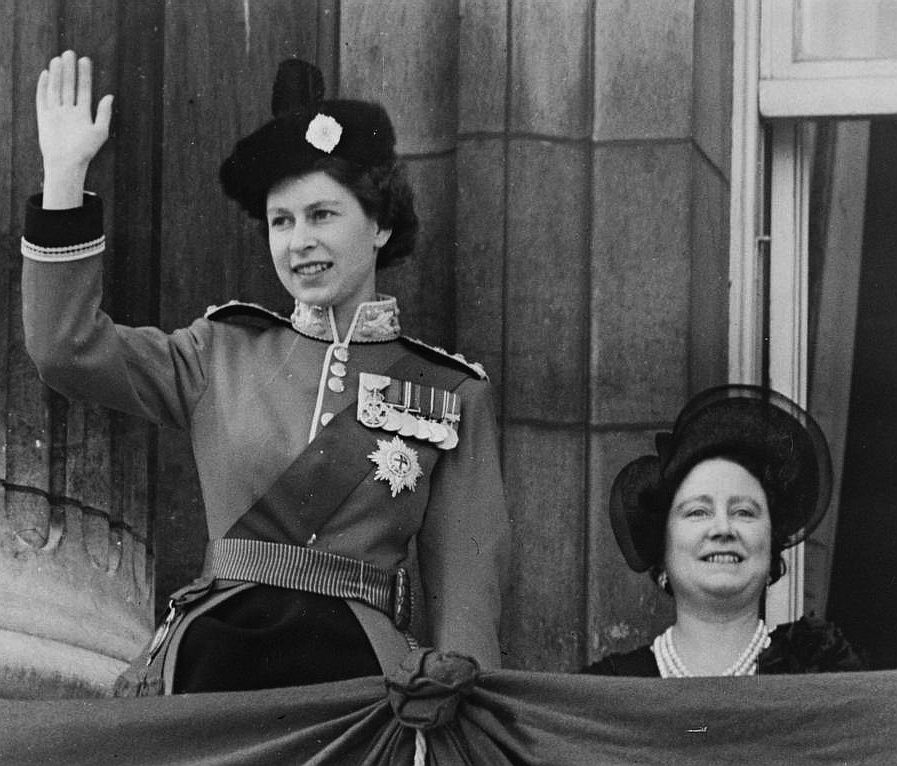

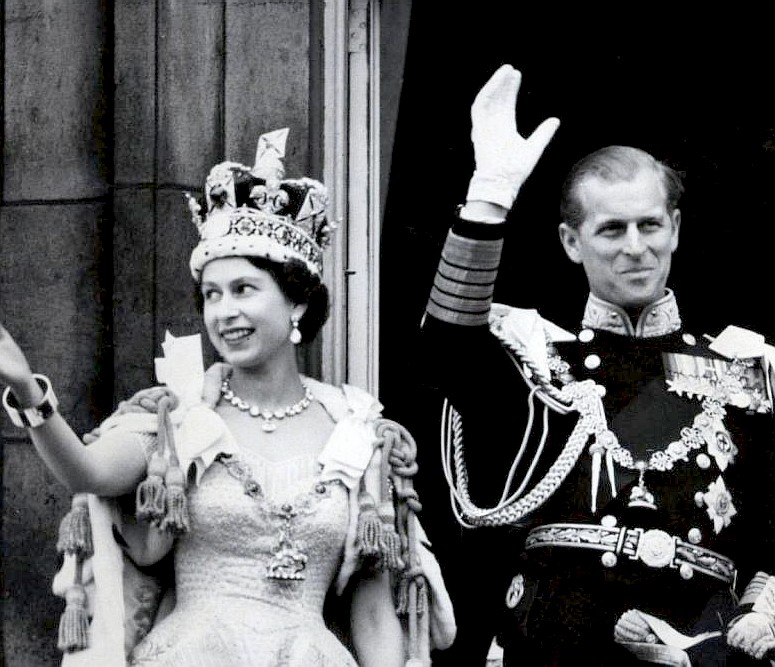



HOW OLD IS THE
QUEEN ?
The Queen was born in 1926, she celebrated her 90th birthday in 2016 and turned 92 in 2018. We are looking forward
to many more years under our present monarch given that she is in good
health and living in enlightened times. We could see some massive
celebrations in 2026 when she attains the grand age of one hundred and
becomes a centenarian. Who though would send her a congratulatory
telegram? Most of us we suspect.
| YEAR |
AGE |
EVENT |
| - |
- |
- |
| 2016 |
90th |
Birthday |
| 2017 |
91st |
Birthday |
| 2018 |
92nd |
Birthday |
| 2019 |
93rd |
Birthday |
| 2020 |
94th |
Birthday |
| 2021 |
95th |
Birthday |
| 2022 |
96th |
Birthday |
| 2023 |
97th |
Birthday |
| 2024 |
98th |
Birthday |
| 2025 |
99th |
Birthday |
| 2026 |
100th |
Birthday |
Queen Elizabeth II is the oldest monarch to have reigned in Britain, with second place going to
Queen Victoria who lived to the age of 81.
With modern medicine and a good diet, who knows what age our Queen
might live to. The phrase "Long live the Queen" has new
meaning where the average human age in global terms is increasing every year.




WHAT
IS A CENTENARIAN ?
A centenarian is a person who lives to (or beyond) the age of 100 years. Because life expectancies worldwide are below 100 years, the term is invariably associated with longevity. In 2012, the United Nations estimated that there were 316,600 living centenarians worldwide.
As life expectancy is increasing across the world, and the world population has also increased rapidly, the number of centenarians is expected to increase quickly in the future. According to the UK ONS, one-third of babies born in 2013 in the UK are expected to live to 100.
A supercentenarian, sometimes hyphenated as super-centenarian, is a human who has lived to the age of 110 or more, something only achieved by about one in 1,000 centenarians.
Even rarer is a person who has lived to age 115 – there are only 46 people in recorded history who have indisputably reached this age, of whom only Kane Tanaka, Maria Giuseppa Robucci and Shimoe Akiyama are living as of 2018.
In the United Kingdom and the other Commonwealth realms, the British (and Commonwealth) monarch sends greetings (formerly as a telegram) on the 100th birthday and on every birthday beginning with the 105th. The tradition of Royal congratulations dates from 1908, when the Secretary for King Edward VII sent a congratulatory letter to Reverend Thomas Lord of Horncastle in a newspaper clipping, declaring, "I am commanded by the King to congratulate you on the attainment of your hundredth year, after a most useful life."
The practice was formalised from 1917, under the reign of King George V, who also sent congratulations on the attainment of a 60th Wedding anniversary.
Queen Elizabeth II sends a greeting card style with the notation: "I am so pleased to know that you are celebrating your one-hundredth birthday, I send my congratulations and best wishes to you on such a special occasion", thereafter each few years the card is updated with a current picture of the Queen to ensure people do not receive the same card more than once. The Queen further sends her congratulations on one's 105th birthday and every year thereafter as well as on special wedding anniversaries; people must apply for greetings three weeks before the event, on the official British Monarch's website.
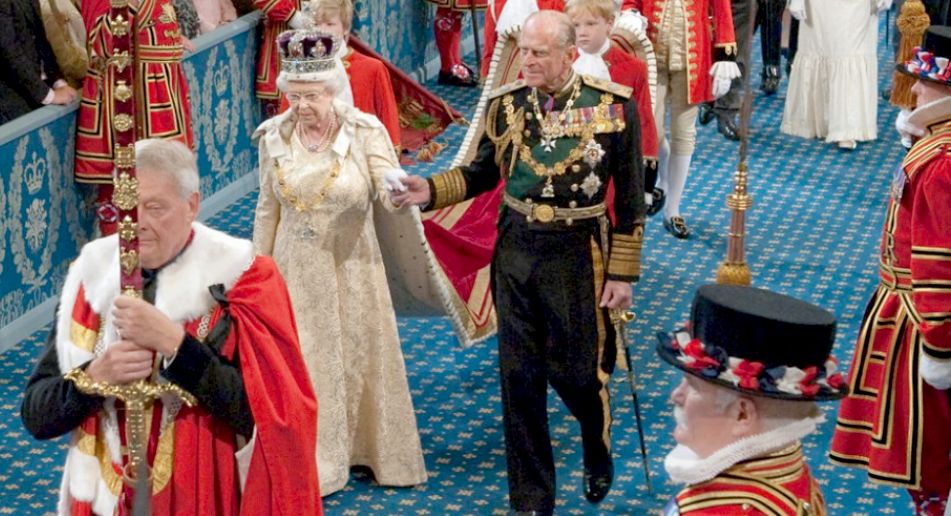
THE
HEAD OF STATE -
The head of State is also a Mason
supporter according to the inside leaf of many yearbooks. It was a shock
to learn of this, but the revelation may go some way to explaining why it
is that some people get targeted by their local authorities such as Councils
and the Police and those local
authorities are immune. We are though on a Crusade
of a different kind, seeking justice and transparency for all as per the
United Nations agenda SDG
16.
DAILY
MAIL QUICK GUIDE - HOW CAN WE LIVE TO 100 ?
Could we all be living to the age of 100 with the right food and lifestyle? Around the world there are communities where people live for up to 120 years.
In this article the Mail reveals their five longevity 'hot spots', their health secrets - and what you can learn from them,
much of which concerns anti oxidants from eating the right diet of cereals
and vegetables:
Japan
The Okinawa Archipelago, a group of 161 coral islands in the East China Sea, is home to the Earth's longest-living people. They have the lowest levels of heart disease and strokes in the world.
Diet: The traditional Okinawan diet is based on sweet potatoes, leafy greens and whole grains, and is supplemented with fish, rice, pork and soya products, all foods rich in anti-cancer and anti-ageing antioxidants which fight the free radical cells that cause cancer.
Freshly caught fish: eaten two or three times a week, is a good source of omega 3 essential fatty acids. Soya: eaten by Okinawans regularly, protects against cancers and lowers levels of 'bad' cholesterol. Whole grains and noodles: constitute a third of the diet. Noodles made from buckwheat contain anti-cancer vitamin B17.
Meat: they love pork but eat meat with the fat trimmed off and usually boiled. Salt: used sparingly so they do not suffer from illnesses associated with high salt intake such as high blood pressure. Green tea: drunk three times a day scented with jasmine flowers, it has more antioxidants than any other food or drink, as well as catechins, thought to stop cancer cells reproducing.
Lifestyle: Most Okinawan islanders are fishermen or farmers and work outdoors even into their 80s, taking regular aerobic exercise, including martial arts and traditional dance, as well as gardening and walking. They also meditate regularly, which, studies suggest, can slow the ageing process.
Greece
On the Greek island of Symi, situated off the Turkish coast about an hour by sea from Rhodes, inhabitants regularly live to their 90s.
Diet Symiots enjoy olive oil, fish, tomato sauces, vegetables, salads and little meat. Raw or lightly cooked vegetables form the bulk of the meals and there are plenty of the right types of fat, low amounts of saturated fat and an absence of refined or processed foods.
Extra virgin olive oil: consumed with everything, it raises levels of 'good' cholesterol and aids digestion. Fruit and vegetables: artichokes, green beans, stuffed vine leaves, potatoes and Greek salads are a key part of the diet.
Tomatoes: researchers believe the tomato is a source of lycopene, a powerful antioxidant that gives tomatoes their red colour.
Garlic: eaten with everything and contains at least 12 different antioxidants, including selenium and zinc.
Capers: used in salads and in rabbit and fish dishes. They are thought to ease stomach ailments and other conditions. Homemade wholemeal bread: Made with wholemeal wheat and sesame seeds which contain fibre, B vitamins, iron, magnesium, zinc and vitamin E.
Organic feta cheese and yoghurt: feta is made from ewe's or goat's milk, which is easier on digestion. Wine: drunk with most meals and credited for the low rates of heart attacks.
Lifestyle: Islanders enjoy low stress and happy families, and some experts believe that Mediterranean men's ability to express their feelings may lower stress and help to make the heart healthy.
Vegans
stand a good chance of living to a ripe old age, except that honey has
long been known for its healing qualities.
LINKS
& REFERENCE
https://www.express.co.uk/news/royal/662767/Queen-s-Birthday-Why-Does-Elizabeth-II-Have-Two-Dates-Royal-Tradition
https://www.dailymail.co.uk/health/article-204894/How-live-100-years-old.html
https://www.independent.co.uk/news/people/queens-birthday-eight-of-elizabeth-iis-strangest-powers-and-privileges-a6993621.html
http://www.un.org/en/universal-declaration-human-rights/
http://www.bbc.co.uk/news/uk-21740366
http://thecommonwealth.org/
https://www.royal.uk/celebrations-begin-eve-queens-90th-birthday
https://www.thesun.co.uk/news/3352901/queen-age-elizabeth-ii-birthday-dates/
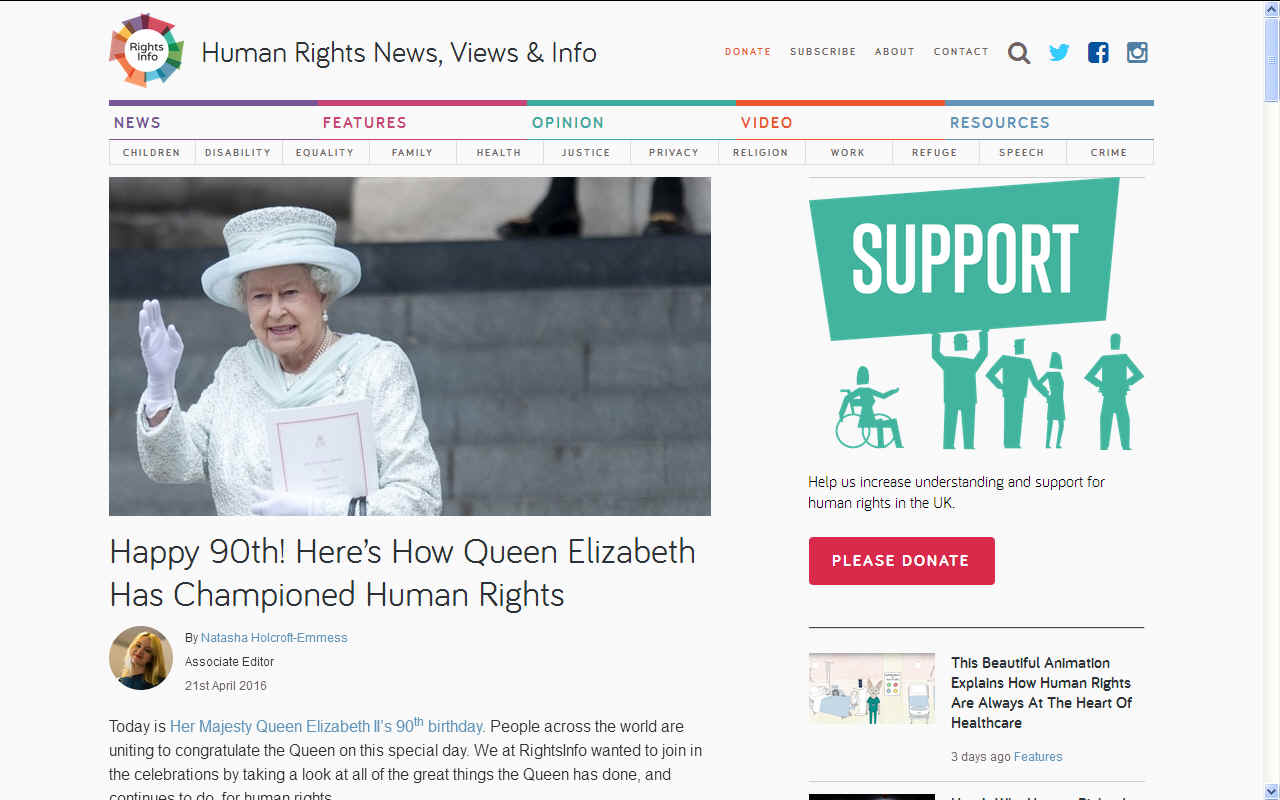
Where
a Council conducts what amounts to an institutionalised
vendetta, or the State by their inaction allows such
vendetta to continue unabated,
the Human
Rights of their victim are violated in many ways.
Ultimately, it is the head of stage who is responsible,
in theory save only for the 1689 Bill of Rights.
In this case it would Her Majesty Queen
Elizabeth II until we have a King to take over.
Where there may be no effective
remedy in the United
Kingdom, the European
Courts might step in save for their 6 month rule.
The United Nations would be the ultimate Court should it
transpire that despite the theoretical right of audience
with the Queen or future King
under the Bill
of Rights 1689, this turns out to be a damp squib.
INDEX
TO THE UNIVERSAL
DECLARATION OF HUMAN RIGHTS
The Kings and Queens of England are above the
law, helping them to lead stress free lives. Security and support is a
wonderful thing. Her Majesty cannot be prosecuted
and does not have to give evidence in any court of law. Wow! Is it not
time for a written constitution to level the playing field. Perhaps it
should be that in a
democracy of any kind nobody
should be above the law even if we do love them.
